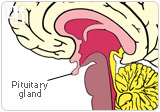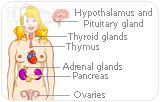
No bigger than a pea, the pituitary gland is an endocrine gland that can be found at the base of the brain. The functions of this tiny, yet important, part of the hormonal system work with the hypothalamus, which is also linked to the nervous system. Nine hormones are secreted by this gland, and they all help to maintain homeostasis in the body. Women approaching menopause should learn about the pituitary gland and its effects on the body, as it has a huge impact on hormone levels during menopause. Read on to find out more.
What Is the Pituitary Gland?
Widely referred to in medical circles as the master endocrine gland, the pituitary gland is controlled by the hypothalamus and has two parts. These are:
- Anterior pituitary. This is the component that synthesizes hormones before they are secreted. These hormones include the adrenocorticotropic, thyroid-stimulating, growth, prolactin, luteinizing, follicle stimulating, and melanocyte-stimulating hormones.
- Posterior pituitary. This stores two hormones before their release. These are the oxytocin and antidiuretic hormones.
These hormones are released in conjunction with the hypothalamus, and they help the body in various ways. Read on to find out what the pituitary gland is useful for in the human body.
Functions of the Pituitary Gland
The hormones that are produced and secreted by the pituitary gland help the body by controlling these processes:

- Sex organ functions (for both sexes)
- Blood pressure
- Breast milk production
- Water regulation
- Kidney water balance
- Thyroid gland function
- Temperature regulation
- Growth
- Pregnancy and childbirth
The Pituitary Gland and Menopause
Menopause is a natural transition that affects every woman at some point in her life. Low levels of estrogen, progesterone and testosterone are often blamed for signs and symptoms of menopause, but the pituitary gland also plays an important role.
For example, hot flashes occur in the body when the pituitary gland and hypothalamus in the brain become confused and try to force the ovaries to produce the estrogen that the body needs. By becoming overactive it can unwittingly increase body temperature and release too much follicle stimulating hormone.
More about the Pituitary Gland
The pituitary gland has many effects on the rest of the body, as well as the ovaries. For this reason it is important to have good eating habits as well as a regular exercise schedule to keep the pituitary gland in great condition. Click on the following link for more information about ways to treat hormonal imbalance.


